As technology is reshaping our everyday realities, education systems are also evolving to prepare the next generation of professionals for emerging industries. In Korea, one major step in this direction is the Next-Generation Convergence University Project, COSS, led by the Ministry of Education and the National Research Foundation of Korea. COSS, short for Convergence of Specialized and Standardized education, supports nationwide university consortia in offering unified, high-quality education in eighteen diverse sectors. This includes disciplines such as artificial intelligence, big data, next-generation semiconductors, and biohealth. Through this national initiative, universities collaborate to design curricula and provide courses that are open to all students regardless of their major or home institution. It enhances university education by dismantling traditional academic boundaries and encouraging collaborative, interdisciplinary learning across institutions. Currently, universities such as Seoul National University, Korea University, and Hanyang Univeristy are participating, bringing the total to 53 schools involved in the project.
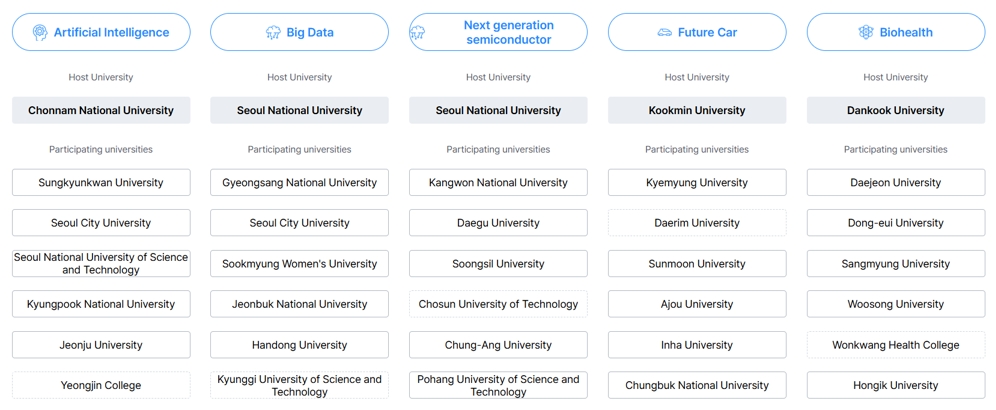
Participating universities of AI, big data, next generation semiconductor, future car, and biohealth sectors
As part of its commitment to the COSS project, SNU currently participates in five key sectors: big data, next-generation semiconductors, new energy industry, aerospace drones, and greenbio. In each of these areas, SNU develops and offers specialized courses that students from universities across the consortium can enroll in. Upon completing the required coursework, students can earn a micro-degree—a certified credential that appears on their transcript, showing expertise in a targeted domain.
These programs go beyond traditional classroom instruction. Students can also participate in events like CO-WEEK, a week where experts in various high-tech fields deliver specialized lectures, and CO-SHOW, where participants explore all COSS domains through interactive booths. Internships, industry-linked projects, and collaborative contests further ready students for real-world challenges.
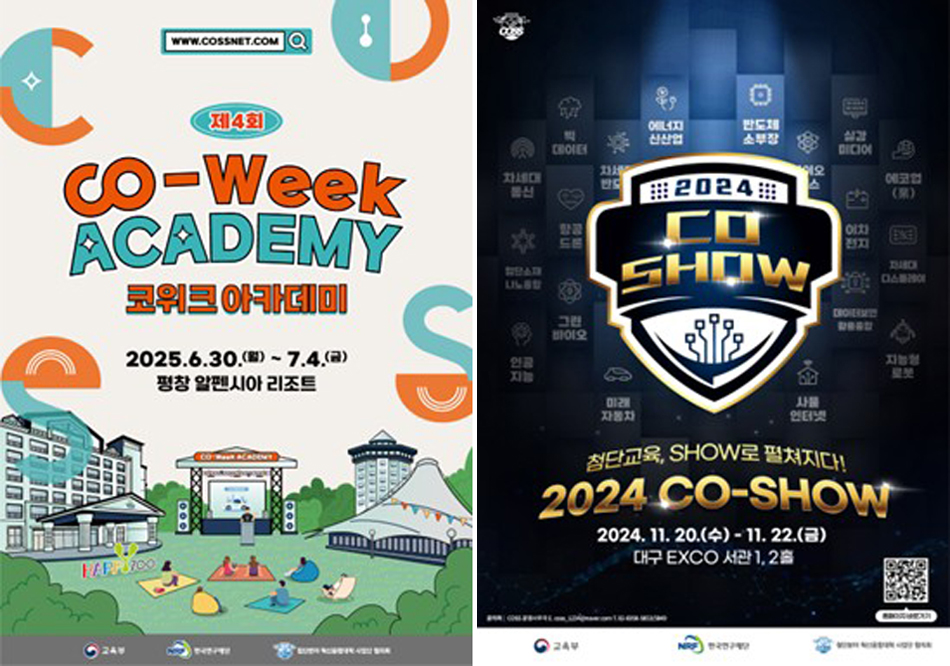

Posters and scenes from CO-WEEK and CO-SHOW events
Among the five COSS focus areas that SNU participates in, the Green Bio Innovation Convergence University is the newest addition, established in 2024. In an era defined by climate instability, ecological degradation, and food security concerns, greenbio technologies have become indispensable. Researching greenbio technologies improves agricultural productivity while minimizing environmental harm, and they have become increasingly relevant not only in farming but also in pharmaceuticals, industrial materials, and energy sectors. As a collaborative consortium formed with five universities, this diversity creates a powerful interdisciplinary environment where students benefit from the combined strengths of institutions specializing in agriculture, environmental studies, and next-generation bio innovation. Through this platform, students can enroll in micro-degree tracks in areas of smart farming, sustainable livestock systems, bioenergy applications, and precision agriculture.
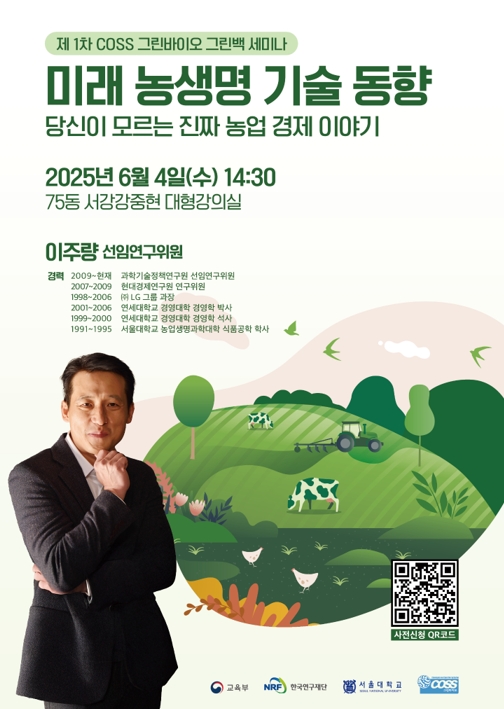
The first Greenbag Seminar on future agri-biotech trends
In parallel with its academic offerings, the Green Bio Innovation Convergence University hosts a wide array of non-curricular programs that connect students with experts and evolving industry practices. One such initiative is the Greenbag Seminar series, which invites leading voices in agri-bio policy and innovation. The inaugural seminar, held on June 4, featured Dr. Lee Jooryang, a distinguished researcher from the Science and Technology Policy Institute(STEPI) and author of the bestseller The Real Story of the Agricultural Economy You Didn’t Know. Dr. Lee’s talk offered a historical and analytical overview of agricultural transformation, which experienced an explosive growth in productivity in the last century after a ten thousand-year-long stagnation. He explained how three major revolutions—mechanization, biochemical advancements, and digital innovation—reshaped global food production and set the stage for modern sustainability challenges.
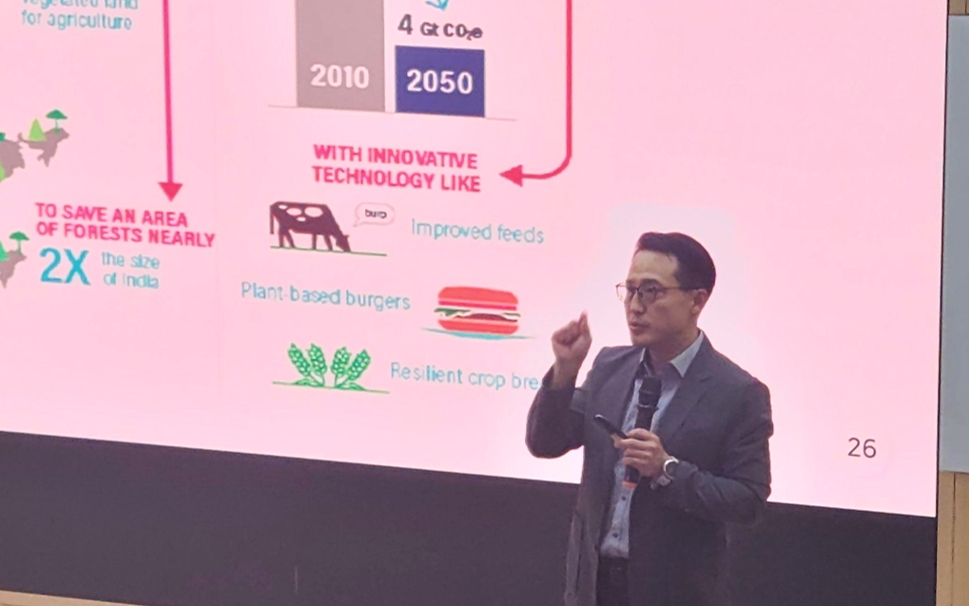
Dr. Lee giving his presentation on the upcoming advances in agri-biotechnology
Dr. Lee emphasized that agriculture is now both a major contributor to and a primary victim of climate change. He used recent case studies from Korea to show how rising temperatures, erratic weather, and ecological degradation are already disrupting the production of staple crops like apples, cabbage, and rice. As a countermeasure, Dr. Lee highlighted the importance of producing more with less. From leveraging biotech tools like GMO crops to deploying AI-powered data systems in farming practices, future agriculture must be smarter, leaner, and more resilient. He also pointed out that policy reform is urgently needed to overcome structural barriers such as land ownership fragmentation, outdated regulatory frameworks, and slow generational turnover in farming communities.
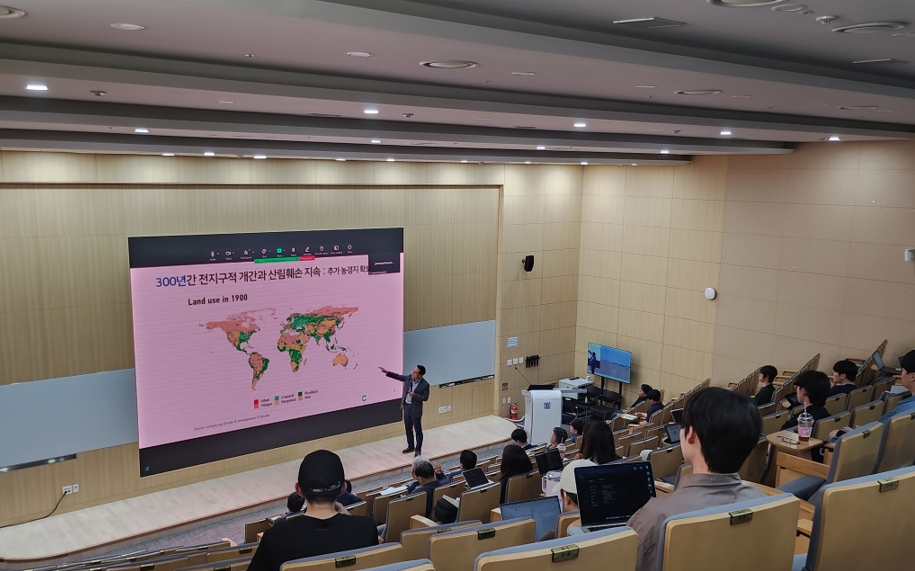
Students listening to Dr. Lee’s talk
The Green Bio seminar is just one example of how the COSS initiative brings real-world challenges into university learning. By connecting campuses, industries, and disciplines, COSS is shaping a new model of future-ready education. Students who wish to obtain further information about the courses and programs are encouraged to visit the official COSS homepage(https://academy.cossnet.com/).
Written by Suh Jeemin, SNU English Editor, jiminasuh@snu.ac.kr

